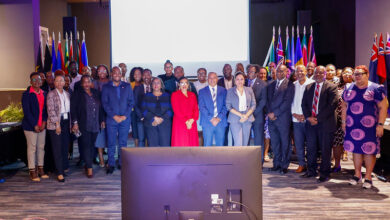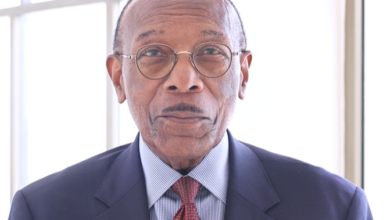This Twenty-Fifth Meeting of the Council for Trade and Economic Development (COTED) is significant as much for the fact that it is actually taking place, as it is for its ultimate goal in helping to fashion a Caribbean Environment and Natural Resource Policy Framework. This is not an easy task given the multifaceted ambit of environmental issues, its widespread impact on the social and political landscape and on the lives and livelihood of the citizens of the Caribbean, and indeed on the future of the Region as a whole.
The magnitude of the task before the Region was fully illustrated during the intensive discussions which took place among the representatives of Governments, CARICOM Institutions and Development Agencies who gathered here on Monday and Tuesday of this week into the long hours of the night, under the skilful chairmanship of Mr. Navin Chandarpal, Presidential Advisor on Sustainable Development, Guyana. These discussions have provided this Ministerial Meeting with a menu of targeted policy options on the various elements that comprise an environmental and natural resource framework.
These discussions also demonstrated beyond a doubt, the complexity of the conceptual and organizational challenges which confront policymakers and practitioners in this field of endeavour (or should I say in these fields of endeavour) and the need for a sharpened focus on strategies to achieve targeted outcomes. It also demonstrated the varying levels of response from Members States to the regional and global commitments of which the Barbados Plan of Action (1994), the Kyoto Protocol and the Mauritius Strategy (2005), provide some of the most significant benchmarks for action.
More recently, our Heads of Government have perceptibly pointed us in the direction of a twin approach to the Region’s development strategy by recognising in the Declaration of Needham’s Point, the integration process as fashioned in the Treaty of Chaguaramus which lead to the achievement of the Caribbean Single Market and Economy. This process of integration can however only be sustained if we apply the principles of functional cooperation – a cross-cutting mechanism for action—to achieve a Community for All.
There are no better candidates to illustrate this maxim than the various components of the environment and natural resource policy framework. It is in this sense that the link between sustainable development and functional cooperation is integral. They both help to harness multi-sectoral, multi-cultural and inter-sectoral programmes around a common objective, that is, to integrate the human and social factors of development with the economic and physical elements essential to increasing the wellbeing and quality of life of the Caribbean peoples. No other imperative makes sense.
Hence, from the launching pad of the broad vision of the interface between us and the environment, the discussions during the Meeting of Officials identified a number of sectors and cross-cutting activities with their own programmatic integrity, but which are all connected by the same and to the same objective to deliver outcomes that improve the environment and the quality of life in the name of human and social development.
Among these specific elements is the need to take more seriously the management of our water resources, the management of disasters, our responses to climate change, and in particular those policies that protect vulnerable groups and communities against the impact of Climate Change. There is another group of elements included in these discussions which is of critical importance. This includes the management of the Region’s energy resources with emphasis on renewable bio- and agro-energy programmes, the management of marine resources and a framework for managing the Caribbean Sea.
However, what emerged from the discussions of the Officials that was most instructive, was the need to focus on the governance of these variegated environment and natural resource issues to ensure that whatever framework is designed could be meaningfully executed with the participation of all partners in Member States and with the expertise of the Regional Institutions and the support of Developing Partners.
In this regard, several options are being placed before this Ministerial Council for consideration. Are we going to perfect the existing Regional Coordinating Mechanisms to Sustainable Development now being pioneered by UNECLAC? How do we include the Social Elements of the Mauritius Declaration which placed emphasis on education, health and culture as critical components of sustainable development? Do we hark back to the essential features of the SIDS Programme? Has the current focus on climate change, important as it is, diverted the programme from its broader objectives? And what about the mechanisms for sustainable resource mobilization and funding? Are the programmes engaging the Region to be donor driven? From whence are the resources to be derived to sustain the environmental agenda? And on what priorities are they to be bestowed?
As you can see, the Officials have provided useful suggestions on the way forward for the Region’s environmental agenda, but they have left a number of issues to be resolved at this Meeting of the Council. These are all questions that are to form the substance of the discussions at this Ministerial Meeting and to which answers must be found.
At least, at the Officials level, there has been a recognition that the key to a coordinated approach to the issues under discussion is to begin with the formulation of a Caribbean Environment and Natural Resource Framework and evolve a strategy which allows partners to knowingly contribute to the objectives which they have had an opportunity to shape and therefore have a commitment to deliver.
The Officials also recognized the need for cohesive leadership of the process and therefore recommended for the consideration of the Ministers, the establishment of a Bureau of Ministers on the Environment to act as an executive group with connectivity through a networking mechanism to Member States and relevant regional institutions and developing partners. The Officials also recognized the need for a regular forum for consultation and decision-making and therefore also recommended that there must be regular meetings of the Council with a focus on the environment.
It is evident that the Officials recognized that a “three-ones” principle is a prerequisite for a coordinated, viable and relevant strategy for sustainable development: One Policy Framework, One Management Structure; One Resource Mobilization Plan. In addition, however, it seems that there is need for a clearly defined information, education and communication strategy which recognizes the potency of the newer information and communications technologies and their reach to the wider communities of the Region and the world. In this respect, no plan, no management structure and no coordinated resource mobilization strategy could collectively or independently be successful if they are not supported by our journalists and media workers, our educators, lawyers, researchers, other specialists and social workers, among others.
It is clear that in discussing how we structure and implement the Caribbean Environmental and Natural Resource Policy Framework, we need to vision that path for the outcomes to be seen as an investment in the future of this Region and the sustainable development of the future of a Community for All .





